University students tend to become isolated from the world after one to five years on campus – so it may come as a surprise to us the way that engineers are perceived by the public. “Engineers Rule the World” and other such slogans show how some of us view engineering. Meanwhile, the public rankings of prestigious occupations place engineers below doctors, scientists, and teachers – near the middle of the ranking scale (Harris Interactive, 2006).
After 3 years in an engineering program myself, I have seen that engineers spend a lot of time and effort solving technical problems, but little time linking these activities to the overall goals. I think that we study engineering because we want to create change in this world, and that that change is not limited to the bridges, circuits, cars, or dams that we create. We have some powerful knowledge that enables us to create large impact and changes in our world. So – why did you go into engineering? What kind of change do you want to create?
For us to start asking these questions and making changes to the public perception of engineering, it’s not just us that has to adapt. The engineering curriculum and education must also play a role in transforming engineering. Unfortunately, the content of engineering education has been reduced over the past century to produce more engineers faster and process more revenue through the education business (Galloway, 2007). This has resulted in eliminating an essential aspect of engineering, which is “to improve the quality of life and to protect the public safety, health, and welfare” (Galloway, 2007). We are not properly trained in public policy, leadership, and communication skills. We also do not always take into account social and environmental considerations when designing a product.
A global engineer is a graduate with these skill sets. Focus groups conducted by Engineers Without Borders with engineering faculty, students, and industry leaders, as well as a definition from the University of Toronto faculty of engineering (Cheng et al., 2008) together created the following list of skill sets that create a global engineer:
-
- A mix of technical, cultural, and socio-political capabilities
- A strong grasp of systems thinking
- An entrepreneurial spirit
- Strong attitudes towards responsibility and continuous learning
The Canadian Engineering Accreditation Board (CEAB) has already begun working towards these changes. The CEAB 2007 Accreditation Criteria and Procedures includes the following evaluation checkpoints for engineering curriculum:
2.1.4 The criteria are intended to ensure that students are made aware of the role and responsibilities of the professional engineer in society and the impact that engineering in all its forms makes on the environmental, economic, social and cultural aspirations of society.
2.2.7. Appropriate exposure to ethics, equity, public and worker safety and health considerations and concepts of sustainable development and environmental stewardship must be an integral component of the engineering curriculum.
Similarly, the Canadian Council of Professional Engineer’s Vision for the Engineering Profession in Canada (CCPE, 2007) stated “Canadian engineers provide leadership to advance the quality of life through the creative, responsible and progressive application of engineering principles in the global context.” This demonstrates the progressive nature of the engineering profession. But change is very slow going, and as students, we can be the catalyst for change.
Engineers Without Borders (EWB) Canada is an organization trying to create momentum for global engineers. This organization’s two founding members are engineering graduates from the University of Waterloo, where the first EWB chapter was created. The UW EWB chapter began a push for creating global engineers in the past summer, by making 14 presentations to engineering classes on the concept of a global engineer.They are also working with faculty members on creating a definition of Life Cycle Assessment (LCA), with the goal of implementing it as a mandatory requirement for all design courses. For more information about this initiative, please contact curriculum@uwaterloo.ewb.ca.
We can keep ourselves informed – by reading the newspaper, taking some STV courses, having an international experience (exchange or coop), we can try to work towards becoming global engineers. Engineering is known to be the application of scientific principles to solve problems for the betterment of society (Chan and Fishbein, 2009) We can and will make an enormous impact as engineers once we graduate. Let’s make sure that impact is a positive one!
References
Galloway, Patricia. The 21st-Century Engineer: A Proposal for Engineering Education Reform. Virginia: American Society of Civil Engineers, November 2007.
Harris Interactive. “Firefighters, doctors, and nurses top list as ‘most prestigious’ occupations,” The Harris Poll #58. July 26, 2006. www.harrisinteractive.com/harris_poll/index.asp?PID=685. Accessed March 23, 2009.
Cheng, Yu-Ling et al. “Interim Report of the Dean’s Task Force on Globalization and Engineering.” Faculty of Applied Science and Engineering, University of Toronto. June 2008.
Chan, Adrian and Jonathan Fishbein. “A global engineer for the global community”, The Journal of Policy Engagement. 2009.




Arthur
Awesome article – and in time to capture the attention of the frosh cohort =)